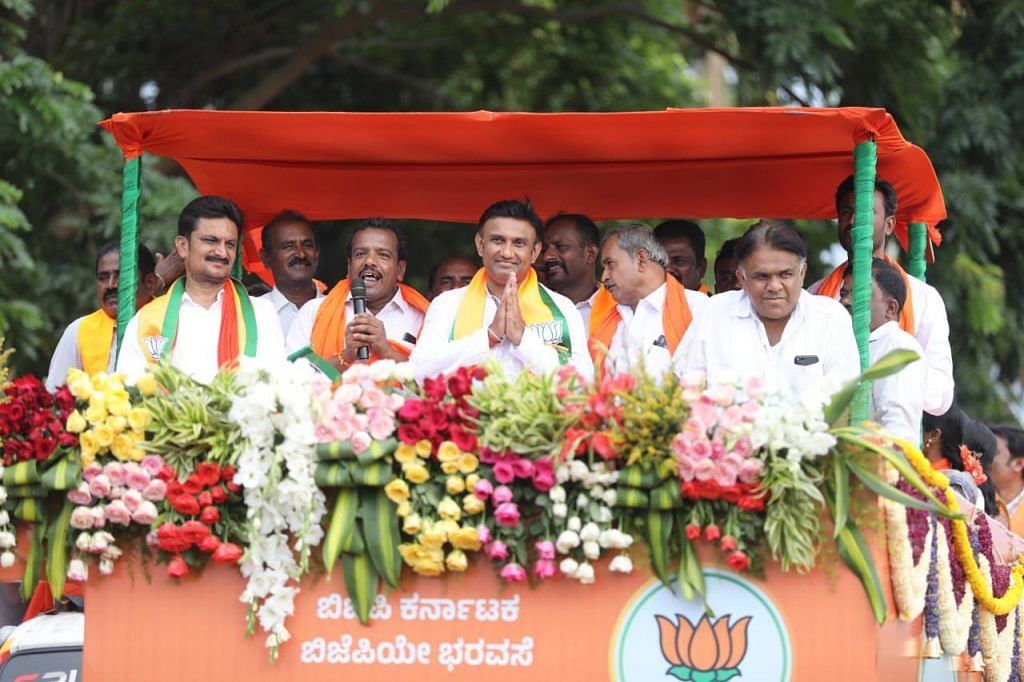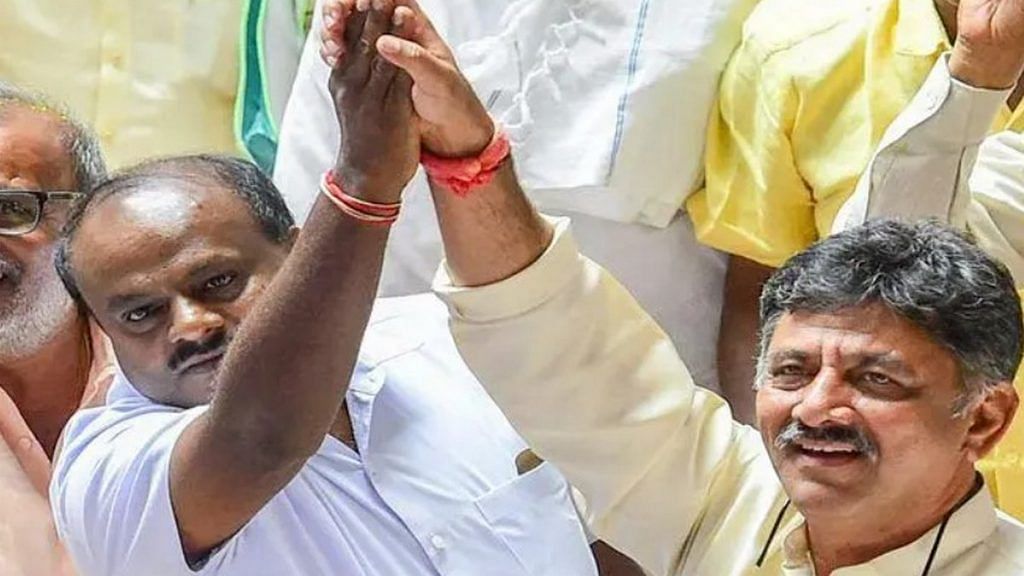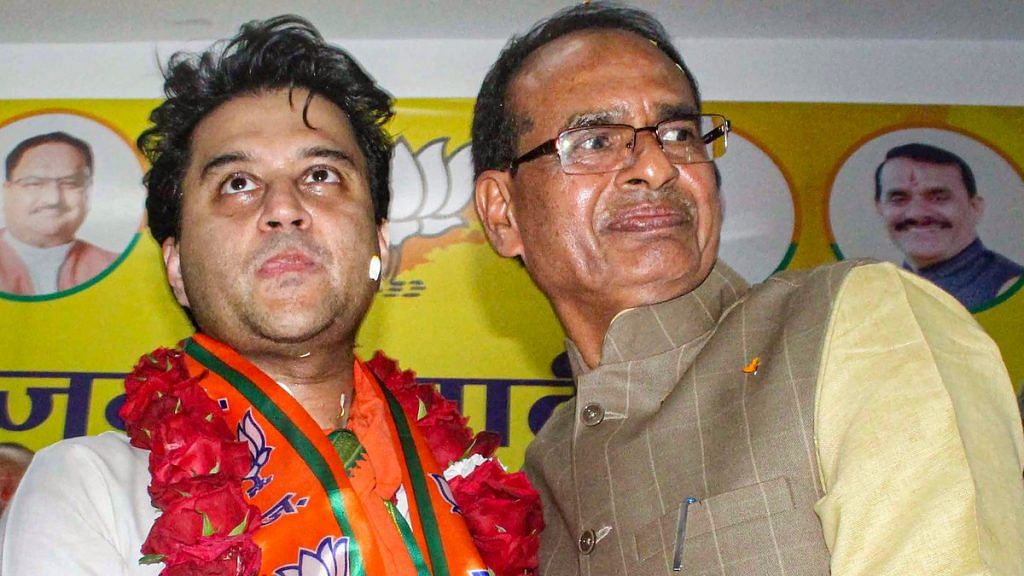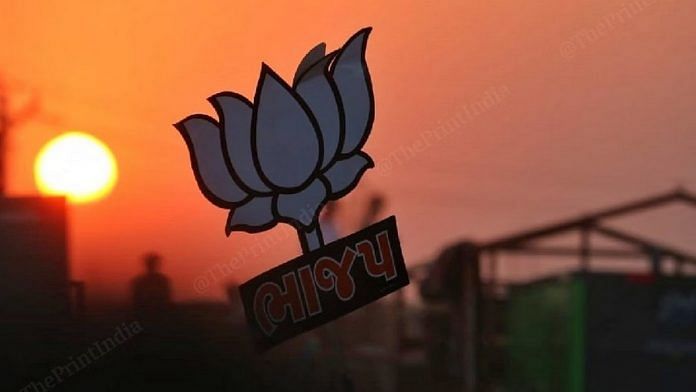New Delhi: In a famous short story, a magical monkey’s paw makes wishes come true, but with dire consequences. It’s been something like that with the BJP’s ‘Operation Lotus’— a strategy of engineering defections from other parties to consolidate power.
The tactic has ‘worked’ in the past, but it has also come back to haunt the BJP in states like Karnataka and Madhya Pradesh.
In the Karnataka elections, where the Congress emerged victorious last week, ‘Operation Lotus’ seems to have played a direct role in the BJP’s diminished tally of seats— down from 103 in the 2018 assembly polls to just 66 in 2023.
In 2019, the BJP brought down the Congress-Janata Dal (Secular) government on the back of ‘Operation Lotus’, which saw 17 of the coalition’s MLAs jumping ship to the party.
Out of these, 14 were rewarded with tickets for the 2023 elections, including 12 sitting MLAs and two leaders who had lost bypolls. Only five of the turncoats in the fray won. Among the nine who lost were several former ministers, including K. Sudhakar and B.C. Patil.
C. N. Ashwath Narayan, Karnataka BJP general secretary, told ThePrint that “rebellion from the cadre against turncoats” was one of the reasons why Sudhakar and Patil were not able to win.

Meanwhile, some BJP veterans who were denied tickets joined the Congress, including Laxman Savadi, a former deputy CM and three-time Athani MLA.
Fighting on a Congress ticket, he defeated BJP’s Mahesh Kumathalli by a margin of over 76,000 votes. Kumathalli was one of the Congress turncoats who helped the BJP bring down the 2019 coalition government.
A district BJP leader from Athani told ThePrint on condition of anonymity that this outcome was expected, claiming that even local BJP cadres supported Savadi despite him switching sides.
“Savadi was a three-time MLA and was denied a ticket without any valid reason. One reason given by state leaders during ticket distribution was that the BJP high command promised a ticket to Kumathalli. However, denying a ticket to our own leader didn’t work well. Only half of the BJP cadres supported Kumathalli,” he said.
According to this leader, similar situations arose in other constituencies with turncoat candidates and where long-time BJP leaders did not receive tickets.
“While some cadres rebelled against the official BJP candidate, others stayed away from campaigning,” he added.
Several BJP leaders who spoke to ThePrint blamed Operation Lotus for the party’s losses in the state, while also criticising the principles underlying it.
They believe that this approach is gradually eroding the party’s ideology, weakening its cadre, and fostering corruption. Here’s a deeper look at why disillusionment is growing with this ‘winning’ tactic in Karnataka and beyond.
Also read: ‘Corruption’ tag, weak leadership, quota misfire — 5 reasons BJP lost South foothold Karnataka
‘What did we gain in the long run?’
Operation Lotus may have been effective, but a growing number of BJP leaders are raising concerns about the pitfalls of trying to grab power at any cost.
“In the long run, what did the party gain from Operation Kamala (Lotus)?” asked a BJP leader from Karnataka.
“The party compromised its ideology and cadres. It invested heavily in luring MLAs with money or making them ministers after they crossed over. This led to corruption and made the party highly unpopular among the people, resulting in the loss of power in the state,” he added.
Karnataka BJP spokesperson Vaman Acharya did not name Operation Lotus, but he did hint at it in an Indian Express piece in which he reflected on the defeat.
“BJP earlier prided itself on being the ‘party with a difference’. It stood out for its ideology of nationalism, idealism, and fresh thinking. The induction of diverse and oftentimes persons having strong ideological opposition into the party, diluted the ideological commitment. And more than this, it brought down the morale of the karyakartas,” he wrote.
In 2020, when then Chief Minister B.S. Yediyurappa expanded his cabinet, he had to offer 10 ministries out of 16 to turncoats who were part of Operation Lotus, denying opportunities to hopefuls among the 104 BJP legislators who had won the 2018 elections.
Ramesh Jarkiholi, who had switched sides from the Congress, was removed from the cabinet in 2021 over a ‘sex scandal’, although he was given a clean chit by the police earlier this year.
To understand how Operation Lotus unfolded in Karnataka, it is important to go back to the 2018 assembly elections and its fractured mandate.
In that election, the BJP had emerged as the single-largest party with 104 MLAs in the 224-member Assembly. The Congress won 78 seats, and the JD(S) and its ally Bahujan Samaj Party got 38 seats combined. Others won two seats.
The BJP then staked claim to form the government, but Congress and JD(S) formed an alliance and with a collective 116 MLAs, they were able to remove the BJP from power.

However, their government, led by H.D. Kumaraswamy of the JD(S), lasted for just over a year, toppling in July 2019 after 17 coalition MLAs resigned from their assembly constituencies and joined the BJP. The coalition failed a floor test and the BJP coasted to power.
Significantly, back in May 2018, Kumaraswamy had alleged that the BJP was offering Rs 100 crore to MLAs to shift camp. In a press conference, he referenced another 2008 exodus from the JD(S) and Congress MLAS to the BJP. “If people have forgotten Operation Lotus, I want to remind everyone,” he said.
That year, the BJP under Yediyurappa had reached the majority mark, with the help of independents, but he resigned in 2011 as CM after a controversy over illegal mining in the state.
Trouble in MP?
Divisions, rebellions, and a negative image for the BJP government have also followed ‘Operation Lotus’ in Madhya Pradesh, which is due for polls later this year.
After the 2018 assembly election in the state, the Kamal Nath-led Congress formed a government with support from the Samajwadi Party, Bahujan Samaj Party, and four independents helping it cross the majority mark of 116 in the 230-member Assembly.
However, in March 2020 Congress leader Jyotiraditya Scindia rebelled and brought 22 of his loyalist MLAs (including six ministers) with him to the BJP. Just 15 months after it was formed, the Kamal Nath government fell, and the BJP came to power.

At that time, Congress leader Digvijay Singh had alleged that “Rs 25 crore” as well as ministerial positions had been offered to the rebels to switch sides, a charge dismissed by BJP leaders.
But over time, the coup of 2020 has caused some unpleasant reverberations for the MP BJP, including the creation of two distinct factions.
According to party sources, one faction is more powerful and aligned with Scindia, having secured major ministries in power-sharing. The other faction, despite having a larger number of MLAs, feels disillusioned and is ready to rebel.
Last week, Deepak Joshi, a three-time MLA and son of former CM Kailash Chandra Joshi, left the BJP to join the Congress.
He was first elected as a lawmaker in 2003 and consecutively won the 2008 and 2013 assembly elections. He was inducted as a minister in the Shivraj-led government. However, in 2018, he was defeated by Congress candidate Manoj Chaudhary, who later joined the BJP as one of the 22 Scindia MLAs. He then won a by-election from Hatpipliya constituency.
Speaking to ThePrint, Deepak Joshi claimed there is a sustained campaign within the BJP to sideline those who are attached to the party’s ideology and to reward those who have loyalties to individual leaders like Jyotiraditya Scindia or CM Shivraj Singh Chouhan.
“Presently, the party is bowing before Scindia. There are many leaders in the BJP who feel they are being ignored or not respected, and who are in touch with the Congress,” Joshi said.
There are a significant number of leaders in the Gwalior Bundelkhand region who feel that the party has been taken over by Scindia, party sources said.
Last month, a delegation of 14 state and central BJP leaders travelled across MP to address the grievances of party veterans and to convince them to “drink poison like Neelkanth” and act for the benefit of the party.
The prospect of rebellion looms particularly in the 19 seats where Scindia supporters contested the by-elections, with 13 of them winning on BJP tickets.
Sources said that BJP leaders who have dedicated their lives to the party now find themselves marginalised on these 19 seats and are mulling their next steps.
The party in Madhya Pradesh is caught in a catch-22 situation in some seats.
For example, on the Gwalior seat, Scindia loyalist Pradhuman Singh Tomar won the 2018 election by defeating the firebrand BJP leader and former MP Jaibhan Singh Pawaiya.
Tomar then switched sides in 2020 and became a minister in the Shivraj government after winning the by-election. Now, both Tomar and Pawaiya, who is known as a critic of Scindia and has fought against him in the past, are demanding tickets from Gwalior.
Then there is the Gwalior (East) seat, where there are multiple ticket hopefuls, including former BJP MLA Anoop Mishra (nephew of Vajpayee) and Scindia loyalist Munna Lal Goyal.
Last week, said MP BJP sources, Shivraj Singh Chouhan met with Anoop Mishra to convince him not to leave the party. Similar disgruntlement is also said to exist concerning the other seats held by Scindia loyalists, where the BJP’s homegrown cadre is challenging the turncoats.
A BJP MP from Madhya Pradesh told ThePrint that he despaired at the change in the party’s culture due to the focus on poaching.
“We have come a long way from being a cadre-based party to a mass-based party. The ideology of the Vajpayee-Advani era is a thing of the past. Vajpayee lost the government by one vote in 1998. Could Vajpayee have imagined this level of poaching, breaking parties one after another to grab power?” he asked.
“Today, we poach 20 MLAs in one go, and sometimes we assimilate an entire party, as we did in Arunachal Pradesh. In this situation, we cannot expect honesty and idealism from such leaders, for whom power is supreme at any cost,” he added.
Goa ‘Operation Lotus’
Goa is another example where the BJP co-opted 10 Congress MLAs in July 2019, along with others, to join the party.
This move gave the BJP a majority of 27 MLAs in the 40-member assembly, and turncoats like Chandrakant Kavlekar, Michael Lobo, and Atanasio Monserrate were given ministerial berths
Veteran Goa BJP leader Rajendra Arlekar— currently Bihar Governor— had at that time described such imports as the “Congressisation” of the BJP.
“Party workers, in general, are hurt by such moves. This is like the Congressization of the BJP, departing from our own ideology. It has hurt our party workers who tirelessly worked for the party,” he had told mediapersons.
In a similar move in 2022, former Goa CM Digambar Kamat and seven other Congress MLAs defected to the BJP.
Goa Chief Minister Pramod Sawant, while taking a jibe at Rahul Gandhi, said that the “Congress Chhodo Yatra’ (Quit Congress Movement) saw its beginnings in Goa.
Speaking to The Print, a BJP MLA from Goa said that most plum portfolios are with turncoats.
“Those who worked for the party are left behind in this new culture of the party. Those who switched sides, can we expect that they will not recover their cost of joining? Look at what happened to Manohar Parrikar’s son; the party didn’t even give him a ticket,” he said.
In May 2022 Utpal Parrikar, son of late former Goa CM Manohar Parrikar contested as an independent (and lost) after the BJP did not give him a ticket.
‘Party suffers, ideology suffers’
In the last few years, BJP has carried out Operation Lotus in different states, adopting different methods and with varying degrees of success of success or failure.
For example, in 2020, the party tried an operation in Rajasthan similar to the one in Madhya Pradesh, to capitalise on a fracture between Congress leaders Sachin Pilot and Chief Minister Ashok Gehlot. However, it did not succeed in toppling the Gehlot government.
In Maharashtra, there was more ‘success’ in 2022, when the party allegedly played a key role in engineering a split in the Shiv Sena and toppling the Uddhav Thackeray-led coalition government in Maharashtra. The winning Shiv Sena faction, under the leadership of Eknath Shinde, went on to form a government with the BJP.
The BJP also allegedly tried to topple Jharkhand’s Hemant Soren-led coalition government, but did not succeed. Last year, three Jharkhand MLAs were allegedly caught with Rs 49 lakh cash in Howrah. They had also purportedly met Assam Chief Minister Himanta Biswa Sarma. The Congress had claimed that the BJP was trying to bring down the government by paying cash to MLAs, which the latter denied.
A Maharashtra BJP MP told The Print that “the next level of infighting” will start once talks for Lok Sabha seats are set in motion.
“At many seats, both BJP leaders and Shiv Sena leaders are asking for tickets for themselves. Dissidents can harm party prospects at many seats if not resolved as few will have to sacrifice the seat,” he observed.
Bangalore University professor SY Surendra, meanwhile, suggested that ‘Operation Lotus’ may be the name given to a BJP strategy, but it comes from an old playbook, and one with a limited success rate.
“Indira Gandhi used this method several times,” he told ThePrint. “She used it to dethrone (Andhra Pradesh CM) NTR when he was away for medical treatment, and installed Bhaskar Rao (in 1984). But NTR, after returning, paraded his 181 MLAs in a wheelchair before the President to prove the majority,” he said.
“The BJP has adopted a similar strategy. It may help for the short run, but in the long term the party suffers, and its ideology suffers,” he added. “But in today’s politics, who cares about ideology and thinks for the long run?”
(Edited by Asavari Singh)
Also Read: PM Modi must worry. Karnataka is the latest sign of a deepening crisis ahead of 2024 LS polls



